Advertisement
Born in '60s San Francisco, all-girl rock band Ace of Cups roars back a half-century later
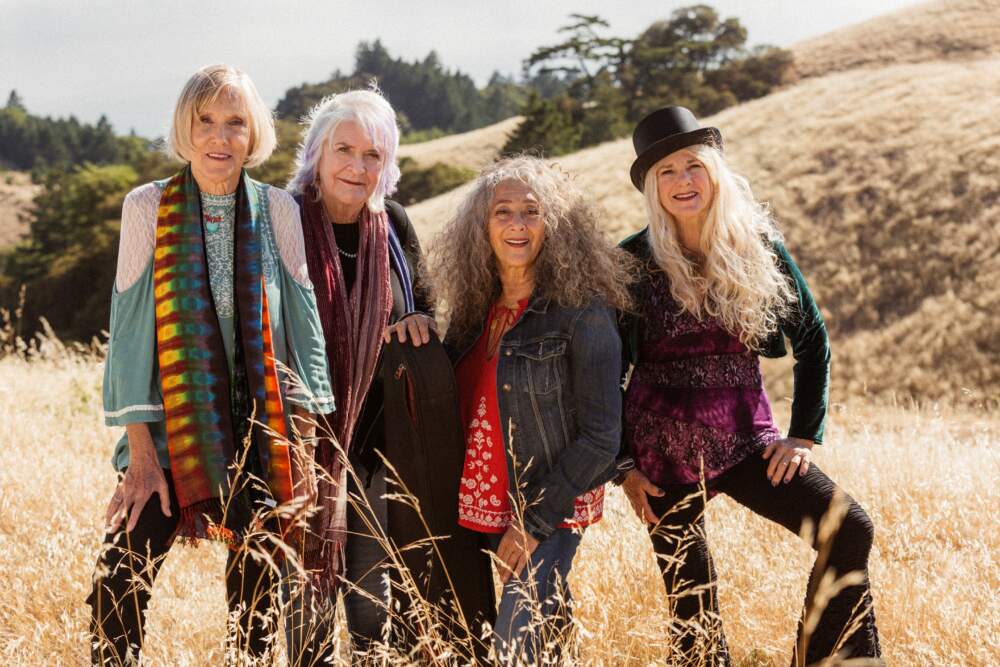
This story is part of WBUR's "The Third Act" series, highlighting people who worked full careers and re-invented themselves later in life, often in surprising and inspirational ways.
In 1967, the all-girl band Ace of Cups burst onto the San Francisco rock and roll scene, attracting a big following and touring with some of the most famous musicians of the era. They earned a rave review from Jimi Hendrix.
It was a dream while it lasted. A documentary called "Revolution" about the 1960s West Coast counterculture shows the five bandmates playing barefoot as they rip through a raucous rendition of their song, "Stones," before a crowd of ecstatic, dancing fans.
The Ace of Cups were having their moment — and then they disappeared.
Now, more than a half-century later, the band members are back together, with an unlikely third act proving rock and roll dreams never die.
Some of the stories in WBUR's "The Third Act" series are about people who reinvent themselves later in life because they're not ready to stop working. Some are about people who have no choice but to keep working. This story is about musicians who are using their third act to reconnect with their past and pursue a passion.
Ace of Cups was born at the end 1966, when 19-year-old Denise Kaufman, a singer who played harmonica and guitar, met guitarist Mary Simpson-Mercy at a New Year's Eve party hosted by the psychedelic rock band, Blue Cheer, in Haight-Ashbury.
"She was jamming some blues up in this bedroom, and I wandered in, and I pulled out my harmonica and we started playing together," Kaufman said.
Simpson-Mercy asked Kaufman if she wanted to join an "all-girl band" that she and her friends were starting.
Advertisement
"My first reaction was, 'Well, that sounds really weird,'" recalled Kaufman. She had played in plenty of groups in which she was the only woman, but had never even seen a band made up only of women.
"I'd never thought of it, truly," she said.
Of course, there were plenty of women rock stars at the time, from Janice Joplin and Grace Slick to Tina Turner. But they all fronted bands of male musicians. An all-girl band that played barefoot and rocked their own instruments? That was something different.
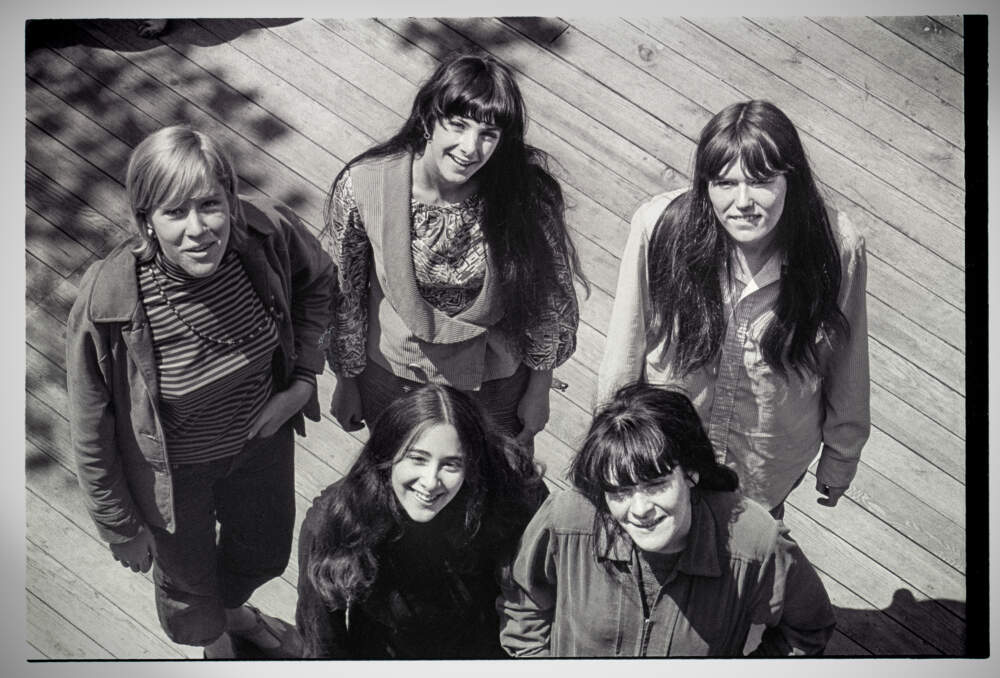
Along with Kaufman and Simpson-Mercy, Ace of Cups included drummer Diane Vitalich, keyboardist Marla Hunt and Mary Gannon, who played bass and called the chance to play in the band "miraculous."
"I grew up in New York and girls just didn't play guitar in my era," Gannon said. "What could I do to perform and be the artist that I was?" Ace of Cups provided the answer.
In bootleg tapes from the '60s that captured Ace of Cups practice sessions and performances, you can hear the band's energy — as it embraced folk, soul and unbound rock and roll with edgy grooves and sharp songwriting.
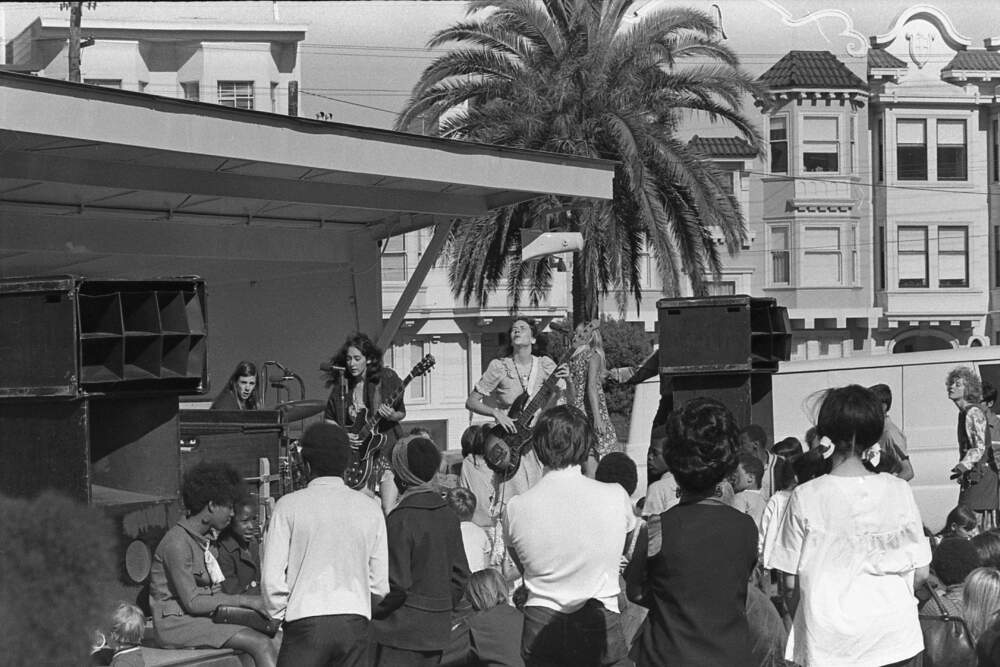
"It's bad for you but buy it," the women chanted in one of their songs that poked fun at the commercialization of 1960s America, adding, "If you had our product, everyone would love you.”
“They were great players and played some great music,” former Jefferson Airplane guitarist Jorma Kaukonen told Rolling Stone magazine in 2022. "They put it all out there."
It didn't take long before the group gained an enthusiastic following around San Francisco, while getting to know some of the biggest names on the rock scene.
“We were just living sort of a dream in a way," Simpson-Mercy said. She recalled seeing Jimi Hendrix for the first time at the Monterey Pop Festival in 1967.
“I had never heard anything like this," she said. And she had never seen anyone set a guitar on fire, as Hendrix did to conclude his performance.
"I couldn't believe it, because I had learned that you always treat your guitar with respect," Simpson-Mercy said. "When he did that, I just thought, 'Oh my God, he's flipped out.'"
A week later, at Golden Gate Park, Ace of Cups opened for Hendrix, who, while touring abroad a few months later, told Melody Maker, the British music magazine: “I heard some groovy sounds last time in the States, like this girl group, Ace of Cups, who write their own songs and the lead guitarist is hell, really great.”
To the band members, it felt like they had reached a kind of pinnacle. Simpson-Mercy said after that experience she dreamt about Hendrix for years and imitated the way he played barred chords, using her thumb to cover the sixth string.
"I still play that way,” she said.
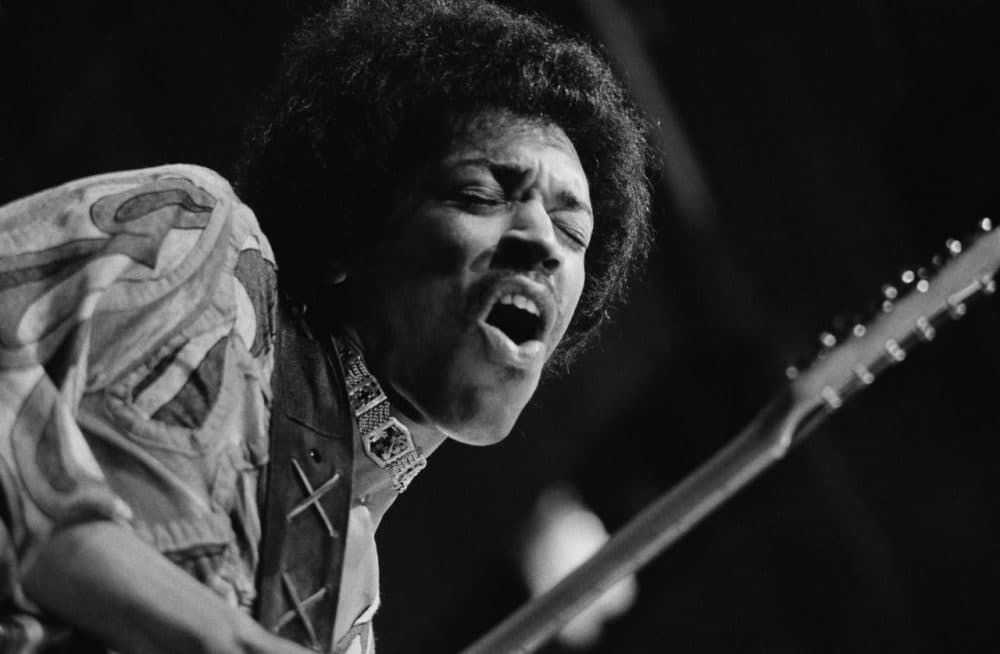
From there, Ace of Cups continued to take off. They toured with Jefferson Airplane, played shows with Joplin, Quicksilver Messenger Service, the Grateful Dead and opened for The Band’s first show ever.
But for all their young success, they never recorded an album. Some record companies expressed interest, but nobody offered them a contract.
"I think that they weren't quite sure what to do with us, how they were going to market us," Gannon said.
Even landing gigs could be a challenge, like when they tried to book San Francisco’s Peppermint Lounge.
“Our manager called there and talked to the booking guy," Kaufman recalled. "And he goes, ‘Yeah, an all-girl band — absolutely — we'll book them. But they have to play topless.'"
The Ace of Cups passed on that gig. Sexism was a real challenge in the business, Kaufman said. By 1972, the band was pretty much done.
"We started having children, so that kind of changes your whole situation if you want to go out of town for a gig," Kaufman said.
"Before too long, a little baby is gonna be born," they sang in "Life in your hands," one of the last songs they performed before splitting up.
Simpson-Mercy lived off the grid for a while, embracing the back-to-nature movement in northern California, and eventually became a mental health counselor. Vitalich worked as a massage therapist. Kaufman co-founded a school in Hawaii, worked as an EMT, and then moved to Los Angeles, where she went to music school and taught yoga to celebrities, from Quincy Jones and Jane Fonda to Madonna and Kareem Abdul-Jabbar.
As a single mother, Gannon found the transition difficult, and for a time relied on odd jobs and food stamps. "I was pretty lost when the band stopped playing," she said. "That was really my dream of everything, the band."
Eventually, Gannon got a degree in special education and launched a new career. But the music dream never died. The band would get together every now and then, until finally, in 2011, George Wallace of High Moon Records saw them perform and was bowled over.
Wallace became a mentor and a backer for the group. He encouraged Kaufman, Simpson-Mercy, Vitalich and Gannon to go into the studio and record some of their old '60s songs and develop new material. (Hunt did not continue with the band.) In 2015, he offered them a contract. Three years later — more than 50 years after they first played together — the four remaining members of Ace of Cups released their debut album.
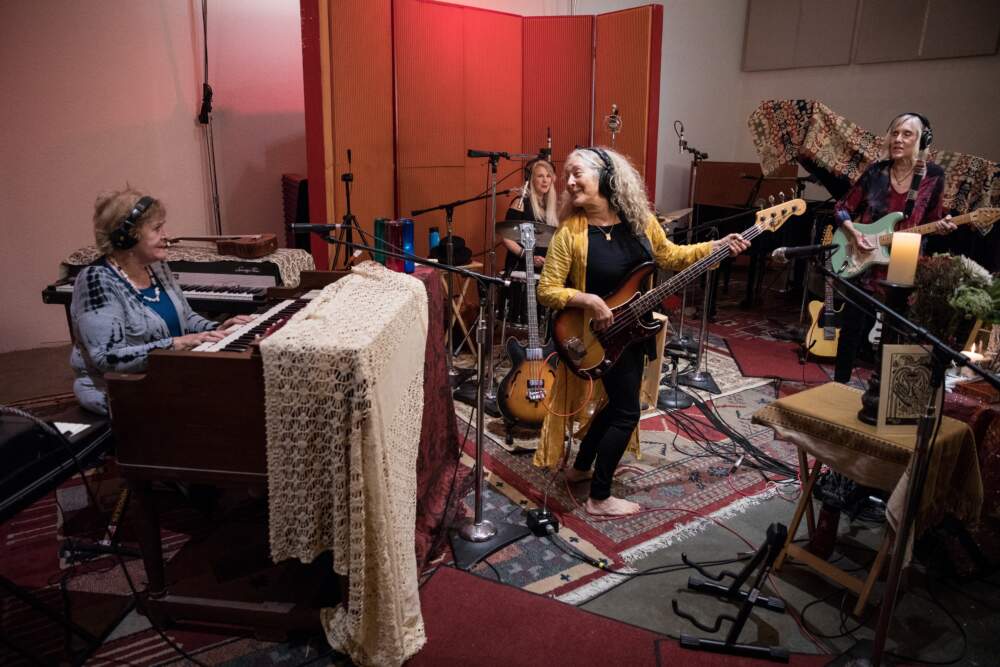
"The Ace of Cups, why they weren't signed — it's unimaginable to me," Wallace told KQED, the NPR affiliate in San Francisco, in 2018. "They were ahead of their time. And at the age of 70-something, they haven't lost a step — in their playing and their songwriting and their spirit."
Suddenly, the band was on NBC's Today Show, playing their song, "Feel Good," their first single since splitting up in the early '70s. Older and grayer, perhaps — three of them are now grandmothers — but still playing with the energy of a half-century ago.
“Working in the studio was just the most incredible thing to happen to us at this time," Simpson-Mercy said. "In some ways, it was just as incredible as what happened back in the '60s.”
The record includes appearances by Taj Mahal, Buffy Saint Marie and Bob Weir of the Grateful Dead. And thanks to all the songs they wrote decades ago, there was no shortage of material to fill the double album. Kaufman said the recording finally proclaimed to the world that Ace of Cups actually existed — and is still going.
“We had nothing to show except for some posters," Kaufman said. "We never got to go in the studio with our music and create it. It was like having children that never got to be out in the world and play."
When the band started touring again, Kaufman would tell audiences, "We're from the '60s, in our 60s." Now in their 70s, they're reminding people that this stage of life can still be the start of something new, rather than the beginning of an unavoidable decline.
"I think there are new possibilities there to really make that last third of your life really as good as it can be," Gannon said. "It's something to look forward to now."
Since their debut album, Ace of Cups has released a second album and an EP. They're still rocking, well into their third act.
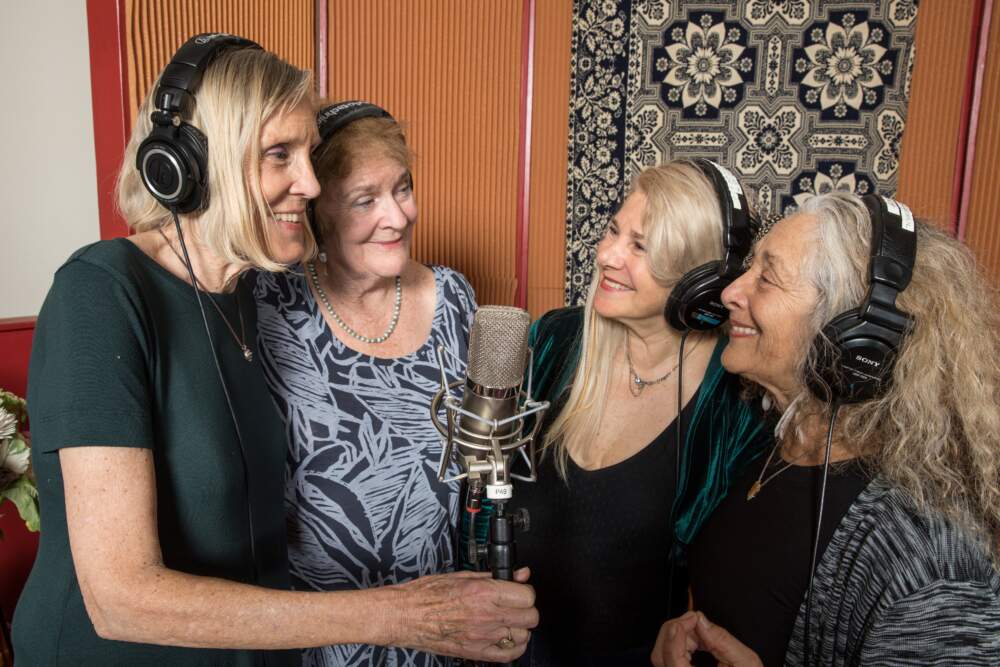
Have you re-invented your life in a surprising or inspiring way? If so, we want to hear about it. Email us at thirdactstory@gmail.com.
This segment aired on November 13, 2023.


